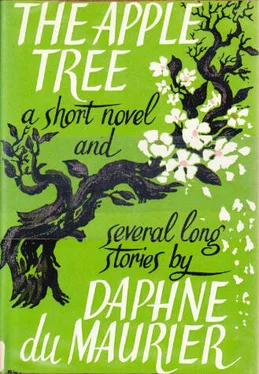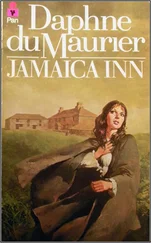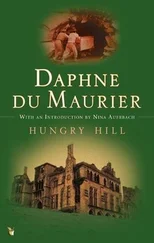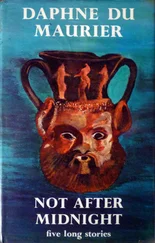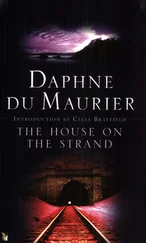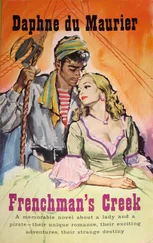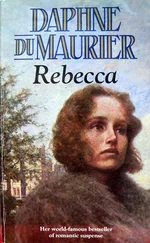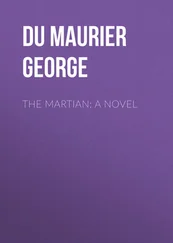Daphne du Maurier - The Apple Tree - a short novel & several long stories
Здесь есть возможность читать онлайн «Daphne du Maurier - The Apple Tree - a short novel & several long stories» весь текст электронной книги совершенно бесплатно (целиком полную версию без сокращений). В некоторых случаях можно слушать аудио, скачать через торрент в формате fb2 и присутствует краткое содержание. Жанр: Современная проза, Триллер, Социально-психологическая фантастика, на английском языке. Описание произведения, (предисловие) а так же отзывы посетителей доступны на портале библиотеки ЛибКат.
- Название:The Apple Tree: a short novel & several long stories
- Автор:
- Жанр:
- Год:неизвестен
- ISBN:нет данных
- Рейтинг книги:5 / 5. Голосов: 1
-
Избранное:Добавить в избранное
- Отзывы:
-
Ваша оценка:
- 100
- 1
- 2
- 3
- 4
- 5
The Apple Tree: a short novel & several long stories: краткое содержание, описание и аннотация
Предлагаем к чтению аннотацию, описание, краткое содержание или предисловие (зависит от того, что написал сам автор книги «The Apple Tree: a short novel & several long stories»). Если вы не нашли необходимую информацию о книге — напишите в комментариях, мы постараемся отыскать её.
The Apple Tree: a short novel & several long stories — читать онлайн бесплатно полную книгу (весь текст) целиком
Ниже представлен текст книги, разбитый по страницам. Система сохранения места последней прочитанной страницы, позволяет с удобством читать онлайн бесплатно книгу «The Apple Tree: a short novel & several long stories», без необходимости каждый раз заново искать на чём Вы остановились. Поставьте закладку, и сможете в любой момент перейти на страницу, на которой закончили чтение.
Интервал:
Закладка:
"No."
"It's yesterday's sun that has done it, sir, and the warm night. Quite a treat she is, with all the blossom. You should go out and take a look at her directly."
Willis left the room, and he continued his breakfast.
Presently he went out on to the terrace. At first he did not go up on to the lawn; he made a pretence of seeing to other things, of getting the heavy garden seat out, now that the weather was set fair. And then, fetching a pair of clippers, he did a bit of pruning to the few roses, under the windows. Yet, finally, something drew him to the tree.
It was just as Willis said. Whether it was the sun, the warmth, the mild still night, he could not tell; but the small brown buds had unfolded themselves, had ripened into flower, and now spread themselves above his head into a fantastic cloud of white, moist blossom. It grew thickest at the top of the tree, the flowers so clustered together that they looked like wad upon wad of soggy cotton wool, and all of it, from the topmost branches to those nearer to the ground, had this same pallid colour of sickly white.
It did not resemble a tree at all; it might have been a flapping tent, left out in the rain by campers who had gone away, or else a mop, a giant mop, whose streaky surface had been caught somehow by the sun, and so turned bleached. The blossom was too thick, too great a burden for the long thin trunk, and the moisture clinging to it made it heavier still. Already, as if the effort had been too much, the lower flowers, those nearest the ground, were turning brown; yet there had been no rain.
Well, there it was. Willis had been proved right. The tree had blossomed. But instead of blossoming to life, to beauty, it had somehow, deep in nature, gone awry and turned a freak. A freak which did not know its texture or its shape, but thought to please. Almost as though it said, self-conscious, with a smirk, "Look. All this is for you."
Suddenly he heard a step behind him. It was Willis.
"Fine sight, sir, isn't it?"
"Sorry, I don't admire it. The blossom is far too thick."
The gardener stared at him and said nothing. It struck him that Willis must think him very difficult, very hard, and possibly eccentric. He would go and discuss him in the kitchen with the daily woman.
He forced himself to smile at Willis.
"Look here," he said, "I don't mean to damp you. But all this blossom doesn't interest me. I prefer it small and light and colourful, like the little tree. But you take some of it back home, to your wife. Cut as much of it as you like, I don't mind at all. I'd like you to have it."
He waved his arm, generously. He wanted Willis to go now, and fetch a ladder, and carry the stuff away.
The man shook his head. He looked quite shocked.
"No, thank you, sir, I wouldn't dream of it. It would spoil the tree. I want to wait for the fruit. That's what I'm banking on, the fruit."
There was no more to be said.
"All right, Willis. Don't bother, then."
He went back to the terrace. But when he sat down there in the sun, looking up the sloping lawn, he could not see the little tree at all, standing modest and demure above the steps, her soft flowers lifting to the sky. She was dwarfed and hidden by the freak, with its great cloud of sagging petals, already wilting, dingy white, on to the grass beneath. And whichever way he turned his chair, this way or that upon the terrace, it seemed to him that he could not escape the tree, that it stood there above him, reproachful, anxious, desirous of the admiration that he could not give.
That summer he took a longer holiday than he had done for many years — a bare ten days with his old mother in Norfolk, instead of the customary month that he had been used to spend with Midge, and the rest of August and the whole of September in Switzerland and Italy.
He took his car, and so was free to motor from place to place as the mood inclined. He cared little for sight-seeing or excursions, and was not much of a climber. What he liked most was to come upon a little town in the cool of the evening, pick out a small but comfortable hotel, and then stay there, if it pleased him, for two or three days at a time, doing nothing, mooching.
He liked sitting about in the sun all morning, at some café or restaurant, with a glass of wine in front of him, watching the people; so many gay young creatures seemed to travel nowadays. He enjoyed the chatter of conversation around him, as long as he did not have to join in; and now and again a smile would come his way, a word or two of greeting from some guest in the same hotel, but nothing to commit him, merely a sense of being in the swim, of being a man of leisure on his own, abroad.
The difficulty in the old days, on holiday anywhere with Midge, would be her habit of striking up acquaintance with people, some other couple who struck her as looking "nice" or, as she put it, "our sort." It would start with conversation over coffee, and then pass on to mutual planning of shared days, car drives in foursomes—he could not bear it, the holiday would be ruined.
Now, thank heaven, there was no need for this. He did what he liked, in his own time. There was no Midge to say, "Well, shall we be moving?" when he was still sitting contentedly over his wine, no Midge to plan a visit to some old church that did not interest him.
He put on weight during his holiday, and he did not mind. There was no one to suggest a good long walk to keep fit after the rich food, thus spoiling the pleasant somnolence that comes with coffee and desert; no one to glance, surprised, at the sudden wearing of a jaunty shirt, a flamboyant tie.
Strolling through the little towns and villages, hatless, smoking a cigar, receiving smiles from the jolly young folk around him, he felt himself a dog. This was the life, no worries, no cares. No "We have to be back on the fifteenth because of that committee meeting at the hospital"; no "We can't possibly leave the house shut up for longer than a fortnight, something might happen". Instead, the bright lights of a little country fair, in a village whose name he did not even bother to find out; the tinkle of music, boys and girls laughing, and he himself, after a bottle of the local wine, bowing to a young thing with a gay handkerchief round her head and sweeping her off to dance under the hot tent. No matter if her steps did not harmonize with his — it was years since he had danced — this was the thing, this was it. He released her when the music stopped, and off she ran, giggling, back to her young friends, laughing at him no doubt. What of it? He had had his fun.
He left Italy when the weather turned, at the end of September, and was back home the first week in October. No problem to it. A telegram to the daily woman, with the probable date of arrival, and that was all. Even a brief holiday with Midge and the return meant complications. Written instructions about groceries, milk and bread; airing of beds, lighting of fires, reminders about the delivery of the morning papers. The whole business turned into a chore. He turned into the drive on a mellow October evening and there was smoke coming from the chimneys, the front door open, and his pleasant home awaiting him. No rushing through to the back regions to learn of possible plumbing disasters, breakages, water shortages, food difficulties; the daily woman knew better than to bother him with these. Merely, "Good evening, sir. I hope you had a good holiday. Supper at the usual time?" And then silence. He could have his drink, light his pipe, and relax; the small pile of letters did not matter. No feverish tearing of them open, and then the start of the telephoning, the hearing of those endless one-sided conversations between women friends. "Well? How are things? Really? My dear… And what did you say to that… She did?… I can't possibly on Wednesday…"
Читать дальшеИнтервал:
Закладка:
Похожие книги на «The Apple Tree: a short novel & several long stories»
Представляем Вашему вниманию похожие книги на «The Apple Tree: a short novel & several long stories» списком для выбора. Мы отобрали схожую по названию и смыслу литературу в надежде предоставить читателям больше вариантов отыскать новые, интересные, ещё непрочитанные произведения.
Обсуждение, отзывы о книге «The Apple Tree: a short novel & several long stories» и просто собственные мнения читателей. Оставьте ваши комментарии, напишите, что Вы думаете о произведении, его смысле или главных героях. Укажите что конкретно понравилось, а что нет, и почему Вы так считаете.
